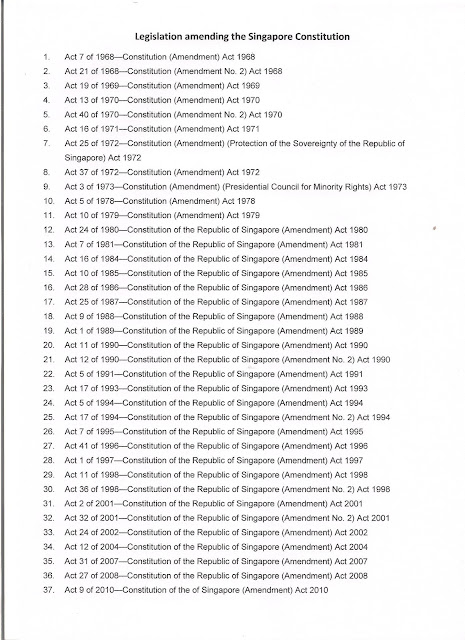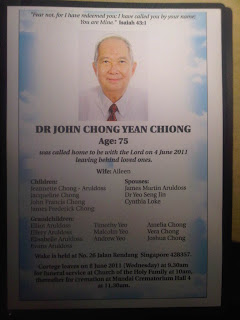Part-time cleaner, Mdm Vellama d/o Marie Muthu
is a Singapore citizen and resident voter of Hougang Single Member Constituency
(SMC).
On 15 February 2012, her Member of Parliament
(MP) was expelled from his political party, which left his parliamentary seat
vacant. The next day, the Prime Minister said that there was no fixed
time within which he must call for a by-election. He added that "there are
many other issues on the national agenda right now".
Unhappy at the prospect of being indefinitely
without the service of an MP representing her vote, Mdm Vellama applied to the
High Court on 2 March 2012 for remedy.
Asking to see the Judge
Mdm Vellama’s High Court application is for a
declaration that the Prime Minister does not have unrestrained discretion when
deciding whether or not a by-election should be called in Hougang SMC, and a
mandatory order requiring the Prime Minister to advise the President to call a
by-election within three months or some other reasonable time determined by the
court.
According to Rules of Court, Mdm Vellama would
first need to obtain the Court’s “leave” (i.e. permission) before her
application can be heard by the Judge and decided on the merits. The
purpose of this initial “leave” stage is to serve as a filter:
“… to be a means of
filtering out groundless or hopeless cases at an early stage, and its aim is to
prevent a wasteful use of judicial time and to protect public bodies from
harassment (whether intentional or otherwise) that might arise from a need to
delay implementing decisions, where the legality of such decisions is being
challenged.”
As the Attorney-General explained:
“Leave must first be
obtained in judicial review proceedings so that cases which are misconceived or
unarguable can be weeded out.”
Hopeless cases which do not deserve to be heard,
should be stopped on its tracks at the door.
On 2 April 2012, a High Court Judge decided that
Mdm Vellama’s application passed the initial filtering test. Mdm Vallama
was given leave for a substantive hearing and a Hearing Date of 16 April 2012
was given to her.
Appeal against Judge’s decision to hear
On 4 April 2012, in a surprising move (at least
to me it was), the Attorney-General filed an Appeal against the High Court
Judge’s decision to grant leave to hear Mdm Vellama’s application. This
effectively translates to Attorney-General saying that Mdm Vallama’s
application does not deserve to be heard and that the decision by the High
Court Judge to hear her out, was wrong. The Attorney-General’s Appeal
will be heard on 16 May 2012.
From anecdotal accounts, it seems that many
Hougang constituents and Singaporeans (including me) share Mdm Vellama’s
unhappiness with the Government’s position that it is not held to any
particular time frame for announcing the Hougang by-election, or for that
matter, any by-election when a parliamentary seat of an SMC becomes vacant.
History of By-Elections
Mdm Vellama’s anxieties are not without
basis. There had been instances in the past, where parliamentary seats
were vacated by the respective MPs due to death or disqualification, but where
no by-elections were held:
(a)
In December 1983, the MP
for Havelock constituency, Hon Sui Sen, passed away in office. His seat was
thus vacated. No by-elections were held in the ward until the General Election
in 1984, when the Havelock seat was erased from the electoral map.
(b)
In November 1986, the
late JB Jeyaretnam’s seat in Anson was vacated after he was disqualified from
holding a seat in Parliament. No by-elections were held and the seat remained
vacant until the 1988 General Election, when the Anson seat was erased from the
electoral map.
(c)
In December 1986, the
Geylang West seat became vacant after its MP Teh Cheang Wan committed suicide.
No by-elections were held until the 1988 General Election when the Geylang West
seat was erased from the electoral map.
Academics have weighed in and Singaporeans are
keen to know the Court’s opinion on the limits of Executive discretion in
respect of SMC by-elections.
Why Appeal?
Given the public interest in Mdm Vellama’s
application, it is perplexing that the Attorney-General has decided to vigorously
challenge the High Court’s decision to hear Mdm Vellama's application. If
the Attorney-General’s Appeal succeeds, Mdm Vellama’s case would be thrown out;
which means that she, Hougang constituents and Singaporeans will be denied of
the Court’s opinion on the question whether the Prime Minister’s discretion is
or is not limited to a definite time-frame for calling by-elections.
If Mdm Vellama’s application is indeed
"legally flawed" as the Attorney-General has argued, then it is
doomed; and the Court will eventually dismiss it after it has been heard.
So what's the harm in letting Mdm Vellama have her day in Court and to let justice
be seen to be done?
Legal Costs?
In Court proceedings, when a party “wins”, the
winning party can ask the Court to order the losing party to pay costs. If the Attorney-General’s Appeal succeeds,
would the Attorney-General ask the Court to order Mdm Vellama to pay
costs? I hope not.
Every Singapore citizen in all other
constituencies has his own elected MP to serve him. Mdm Vellama has turned
to the Court for help because she fears she would not be having what every
Singaporean in all other constituencies has. It would be disappointing
enough if the Attorney-General "wins" their Appeal, for that would
mean that her application is thrown out. To be made to pay the
Attorney-General's legal costs for asking the Court for help, would be a disastrous
result.
Role of Attorney-General
We know that the Attorney-General is the
Government’s legal adviser. If the
Attorney-General serves the Executive, then do the interests of the Executive
coincide, or conflict, with the interests of the public (i.e. citizens) in
respect of the legal questions posed by Mdm Vellama’s application?
What if the Executive one day decides to abolish
SMCs altogether? Or if supposing Executive thinks it is better to hold
elections once in 10 years in the interest of political stability and to avoid
the expense and distraction of holding general elections once every 4 or 5
years?
If (hypothetically) the Executive wants to amend
the Constitution in a manner which serves the political interests of the ruling
party at the expense of civil liberties, and if the ruling party has the
requisite two-thirds majority in Parliament to pass such amending legislation,
who will defend the citizens’ rights from being encroached upon?
What will be the role of the Attorney-General in
such a hypothetical scenario? As the Government’s legal adviser, the
Attorney-General would presumably defend the Government’s position with all its
best efforts.
Workers’ Party’s Complaint in GE 1997
In the aftermath of the 1997 General Elections,
the Workers' Party complained to the police that PAP leaders (Prime Minister Mr
Goh Chok Tong, Deputy Prime Minister Dr Tony Tan and Deputy Prime Minister
Brigadier-General (NS) Lee Hsien Loong) had been inside a Cheng San GRC polling
station on Polling Day, when none of them were candidates for Cheng San GRC.
The Workers' Party cited two sections of the
Parliamentary Elections Act:
Section 82(1)(d):
"No person shall
wait outside any polling station on polling day, except for the purpose of
gaining entry to the polling station to cast his vote".
Section 82(1)(e):
"No person shall
loiter in any street or public place within a radius of 200 metres of any
polling station on polling day."
However, the Attorney-General stated that the
PAP leaders had not broken the law.
Pointing to the use of the word “outside” in
Section 82(1)(d), the Attorney-General explained:
“Plainly, persons found
waiting inside the polling stations do not come within the ambit of this
section. …. Only those who wait outside the polling station commit an offence
under this section unless they are waiting to enter the polling station to cast
their votes.”
As for Section 82(1)(e), the Attorney-General pointed
to the use of the word “within” and explained:
“The relevant question
is whether any person who is inside a polling station can be said to be
"within a radius of 200 metres of any polling station". …Plainly, a
person inside a polling station cannot be said to be within a radius of 200
metres of a polling station.”
If at that time, Singapore had an independent
election body overseeing the election procedures, I think the Workers’ Party
would probably have lodged their complaint to such a body instead of lodging
their complaint to the police as they did.
I wonder how such an independent election body would have dealt with the
Workers’ Party’s complaint.
In the English case of Adler v George [1964] 2 QB 7, the UK Official Secrets Act
1920 stated that it was an offence to obstruct a member of the armed forces “in
the vicinity” of a prohibited place. The defendant was in the station at the
time of the obstruction. He argued that
if he was on the station he could not be in the vicinity of the station. The
court held that it would be absurd for a person to be liable if they were near
to a prohibited place and not if they were actually in it. The defendant’s conviction of the offence was
upheld.
 |
| List of legislation amending the Constitution |
Amending the Constitution
As we know, the provisions of the Constitution
may be amended by the votes of two-thirds of the total number of elected MPs,
which works out to 58 out of the current 87 parliamentary seats. This has
been done numerous times in the past. Since 1965 to date, there have been 37
acts of parliament to amend the Singapore Constitution.
More importantly, Singapore’s electoral system
has been amended at least four times since 1984, each of these amendments
coming into effect shortly before general elections, as the following table
illustrates:
Constitutional Amendment
|
Effective
Date
|
Nomination
Day
|
Lead
Time
|
Introduction of Non-Constituency
Member of Parliament scheme
|
10
Aug 1984
|
13
Dec 1984
|
4
months
|
Introduction of Group
Representation Constituency scheme
|
31
May 1988
|
3
Sep 1988
|
3
months
|
Introduction of Nominated Member
of Parliament scheme
|
10
Sep 1990
|
21
Aug 1991
|
11
months
|
Change in Group Representation
Constituency scheme
|
2
Jan 1991
|
21
Aug 1991
|
7
months
|
Act 41 of 1996
|
12
Nov 1996
|
23
Dec 1996
|
<
2 months
|
I imagine the short lead time between the
effective date of the electoral changes and the date of elections would have
made it difficult for opposition parties to react and to prepare themselves for
elections.
Notably, Singapore has never had an independent
body overseeing election procedures and the drawing of constituency
boundaries. Our Election Department has always been under the Prime
Minister's office. Criticism by opposition parties of an unlevel
political playing field cannot be independently evaluated.
Balancing the Powers
Unless there are sufficient opposition MPs in
Parliament (at least 29) to deny the ruling party their two-thirds majority,
citizens have only two defenders left to protect their civil rights: the
Judiciary and Civil Society.
The effectiveness of the Judiciary in checking
the Executive will be curtailed whenever the scope of judicial review of
executive decisions are being reduced or eliminated (e.g. section 8B(2) of the
Internal Security Act).
The effectiveness of Civil Society in speaking
out for the protection of fundamental liberties will be curtailed so long as
freedom of speech is circumscribed by legislation mandating the requirement to
obtain a licence to speak publicly, assembly or gather in public (Public Order
Act), restricting the formation of societies (Societies Act), vigilant,
vigorous enforcement of defamation laws by political appointment holders, and so forth.
We have heard the old adage: Absolute power
corrupts absolutely. All power must have limits. The exercise of
Executive powers, as with any other kind of powers, cannot be unfettered.
Democracy is a flawed system, no doubt; but this
imperfect system respects the collective voting might of ordinary citizens and
makes everyone equal. Whether rich, influential, poor or obscure – each
citizen has one vote.
In functioning democracies, Executive powers are
checked and balanced by:
- Clearly
defined constitutional guarantees of fundamental liberties
- presence
of sufficient numbers of opposition MPs in Parliament
- an
independent Judiciary with effective, sufficient powers of judicial review
over Executive decisions
- a
Civil Society which is not overly hindered by laws restricting freedom of
speech and public assembly
- an
independent elections commission to oversee election procedures
As of now, are all these
safeguards securely in place in our socio-political landscape?
By Jeannette Chong-Aruldoss
Public Service Commission v Lai Swee Lin Linda [2001] 1 SLR(R) 133 at [23]

.jpg)
.jpg)







